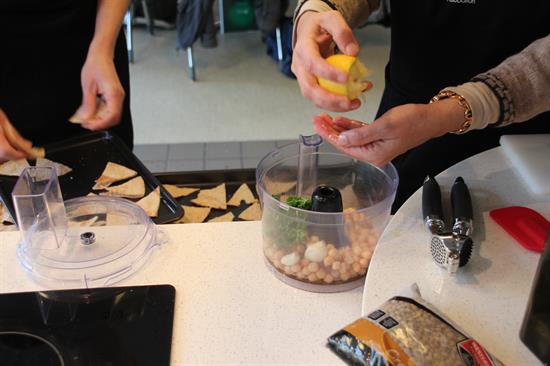Victoria Boomer was going through a hard time when she found comfort in the kitchen. She joined the Food Skills for Families program at Saanich Neighbourhood Place, a non-profit organization dedicated to helping families, and learned to cook.
“I’m more adventurous in the kitchen now and I cook fresh meals,” said Boomer, a mother of two. “It’s healthier and you know what’s going into the food you feed your family and your kids."
The
Food Skills for Families program is designed to connect individuals with host organizations and other people in their communities and make healthy eating and cooking easy, quick and fun. This spring, the BC Centre for Disease Control (BCCDC) will take on a new role in the program’s delivery.
“Food is a subject that stretches across cultures, economic status, age and background,” said Karen Coulson, program manager for Food Skills for Families. “The joy of the Food Skills for Families program is watching people and communities come together, share their skills and eat together.”
The program is designed for populations at risk for chronic diseases. It connects participants with their communities and provides tips and tools so that they learn how to make healthy eating choices. Sessions are held weekly over six weeks and participants learn about food, grocery shopping and cooking, and they get to try out the tasty
recipes from their handbook.
After Boomer completed the program, her mom came to visit from the Interior and was inspired by the meals she saw her daughter cooking for the family. Not long after, when the Food Skills for Families program was offered on the Nlaka'pamux reserve where the family is from, her mom signed up. Now, she cooks more meals from scratch too.

“People gain confidence in themselves in the kitchen,” said Sheila Avery, who ran the program Boomer attended at the Saanich Neighbourhood Place. “It’s about working together as a group to share knowledge and gain skills.”
Community organizations, like Saanich Neighbourhood Place, run the Food Skills for Families program throughout the province. Often a staff member is trained to teach the program and improve food literacy in their community.
Avery says a lot of new parents participate in the program and their main concern is feeding their family, especially if they have picky toddlers. She teaches them some kitchen skills and helps them learn about food sources and how to read and understand nutrition labels.
“If you have diabetes, for example, and you know how to read a nutrition label, it’s really going to help you,” she said.
The Food Skills for Families program began in 2008 and was created and delivered by Diabetes Canada in partnership with the British Columbia Ministry of Health and the Provincial Health Services Authority. The BCCDC, part of the Provincial Health Services Authority, has provided operational management of the program since 2017 and program delivery is transferring to BCCDC on April 1, 2019. The British Columbia Ministry of Health will continue to provide strategic policy direction and oversight for the program.
The BCCDC is a leader in public health and advises health authorities and all levels of government on practices and policies that promote the health of British Columbians and prevent disease. Research shows that eating foods cooked at home using basic, nutritious ingredients is linked with increased consumption of vegetables, fruit and whole grains. The Food Skills for Families program teaches important skills that can support healthy eating and reduce the risk of chronic diseases.
